Unilever's Operations Management: Supportive Functions Analysis
VerifiedAdded on 2023/06/17
|10
|2988
|58
Report
AI Summary
This report delves into Unilever's operations and service management practices, focusing on supply chain management as a key operational strategy. It analyzes the impact of operations management on Unilever's efficiency, highlighting improvements in collaboration, quality control, efficiency rates, market demand responsiveness, and cash flow. The report evaluates the application of technologies, particularly blockchain, in Unilever's functionality, emphasizing traceability, automation, security, quality assurance, and cost savings. Furthermore, it identifies supportive functions linked to operations management, such as purchasing, operations, and logistics, demonstrating how these elements contribute to Unilever's overall operational effectiveness. The analysis provides a comprehensive overview of Unilever's operational strategies and their impact on business performance.
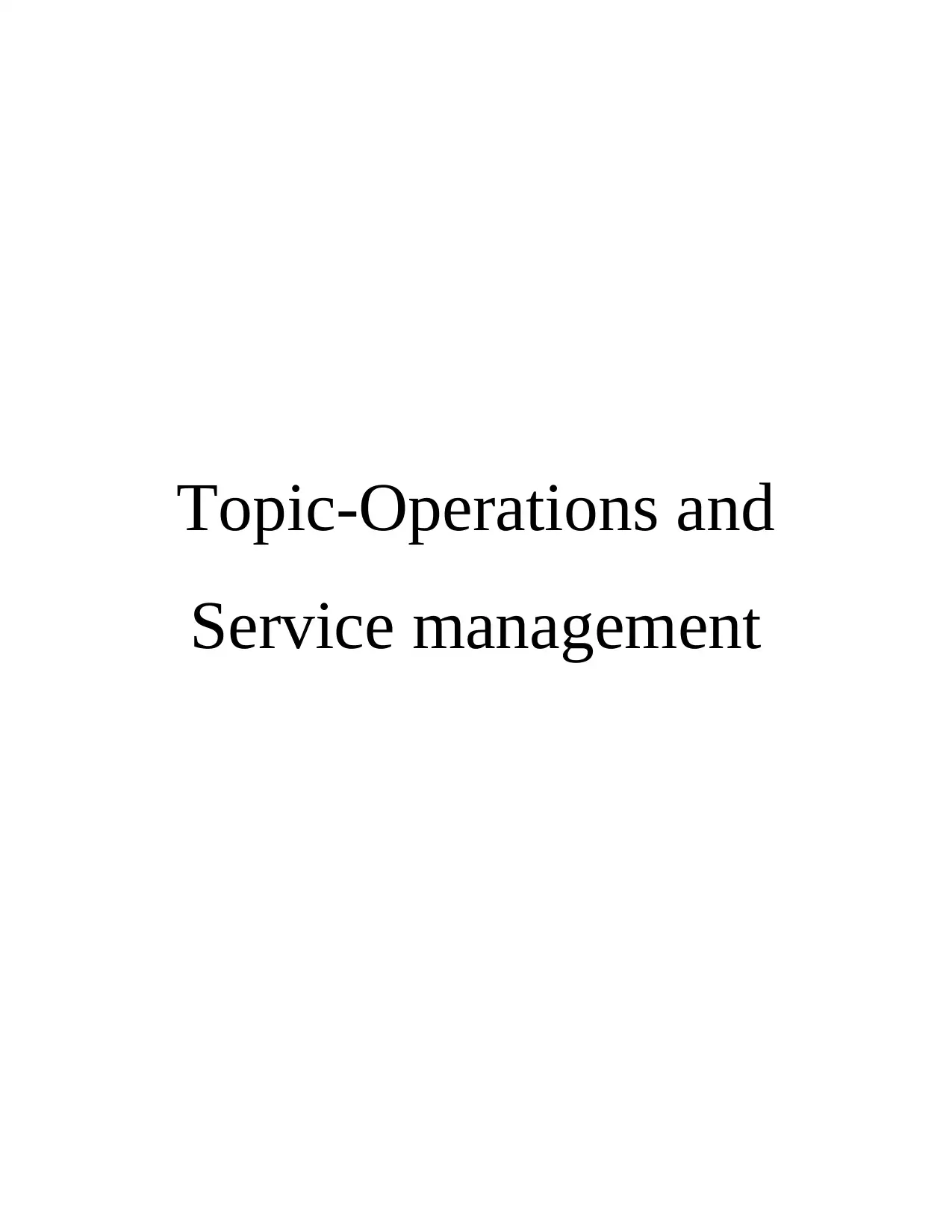
Topic-Operations and
Service management
Service management
Paraphrase This Document
Need a fresh take? Get an instant paraphrase of this document with our AI Paraphraser
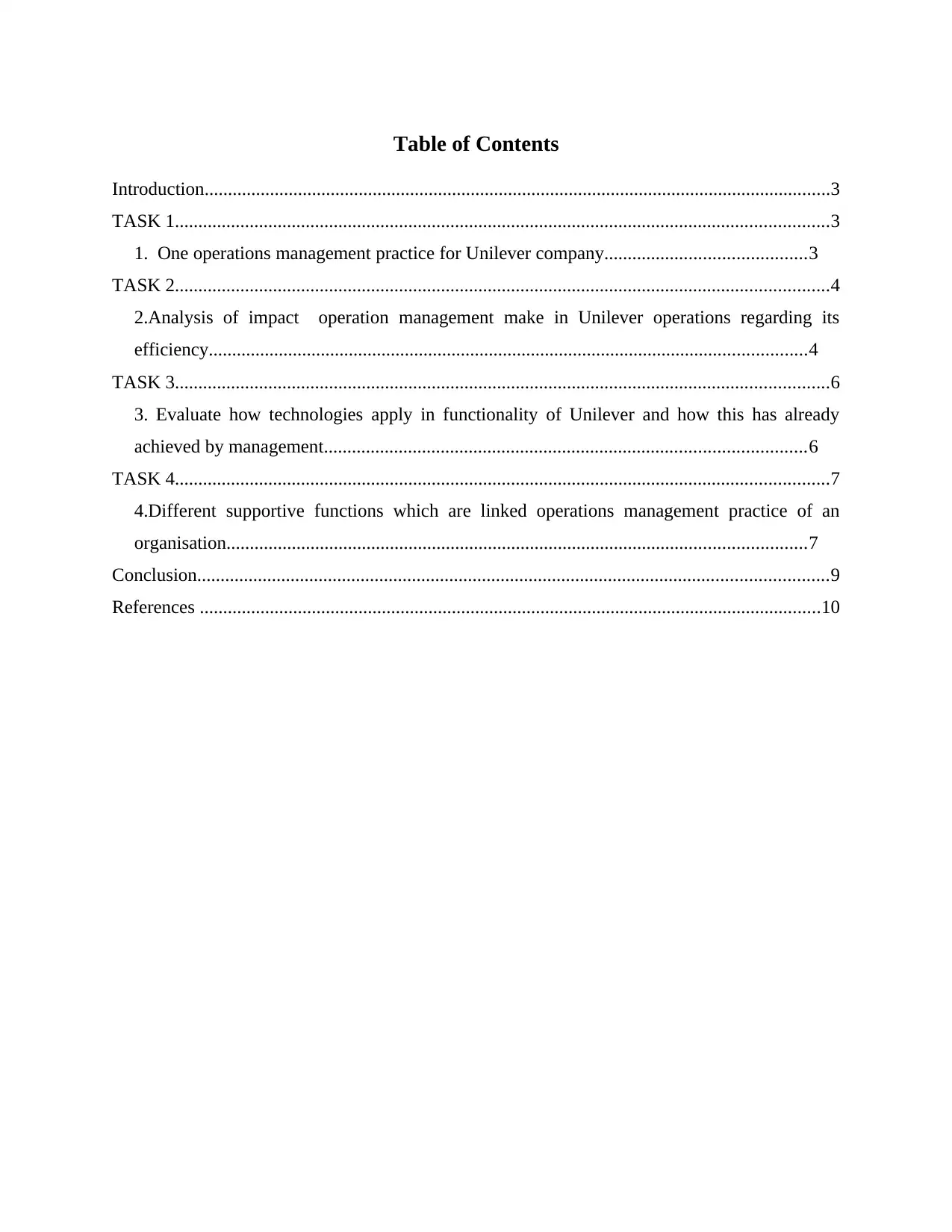
Table of Contents
Introduction......................................................................................................................................3
TASK 1............................................................................................................................................3
1. One operations management practice for Unilever company...........................................3
TASK 2............................................................................................................................................4
2.Analysis of impact operation management make in Unilever operations regarding its
efficiency................................................................................................................................4
TASK 3............................................................................................................................................6
3. Evaluate how technologies apply in functionality of Unilever and how this has already
achieved by management.......................................................................................................6
TASK 4............................................................................................................................................7
4.Different supportive functions which are linked operations management practice of an
organisation............................................................................................................................7
Conclusion.......................................................................................................................................9
References .....................................................................................................................................10
Introduction......................................................................................................................................3
TASK 1............................................................................................................................................3
1. One operations management practice for Unilever company...........................................3
TASK 2............................................................................................................................................4
2.Analysis of impact operation management make in Unilever operations regarding its
efficiency................................................................................................................................4
TASK 3............................................................................................................................................6
3. Evaluate how technologies apply in functionality of Unilever and how this has already
achieved by management.......................................................................................................6
TASK 4............................................................................................................................................7
4.Different supportive functions which are linked operations management practice of an
organisation............................................................................................................................7
Conclusion.......................................................................................................................................9
References .....................................................................................................................................10
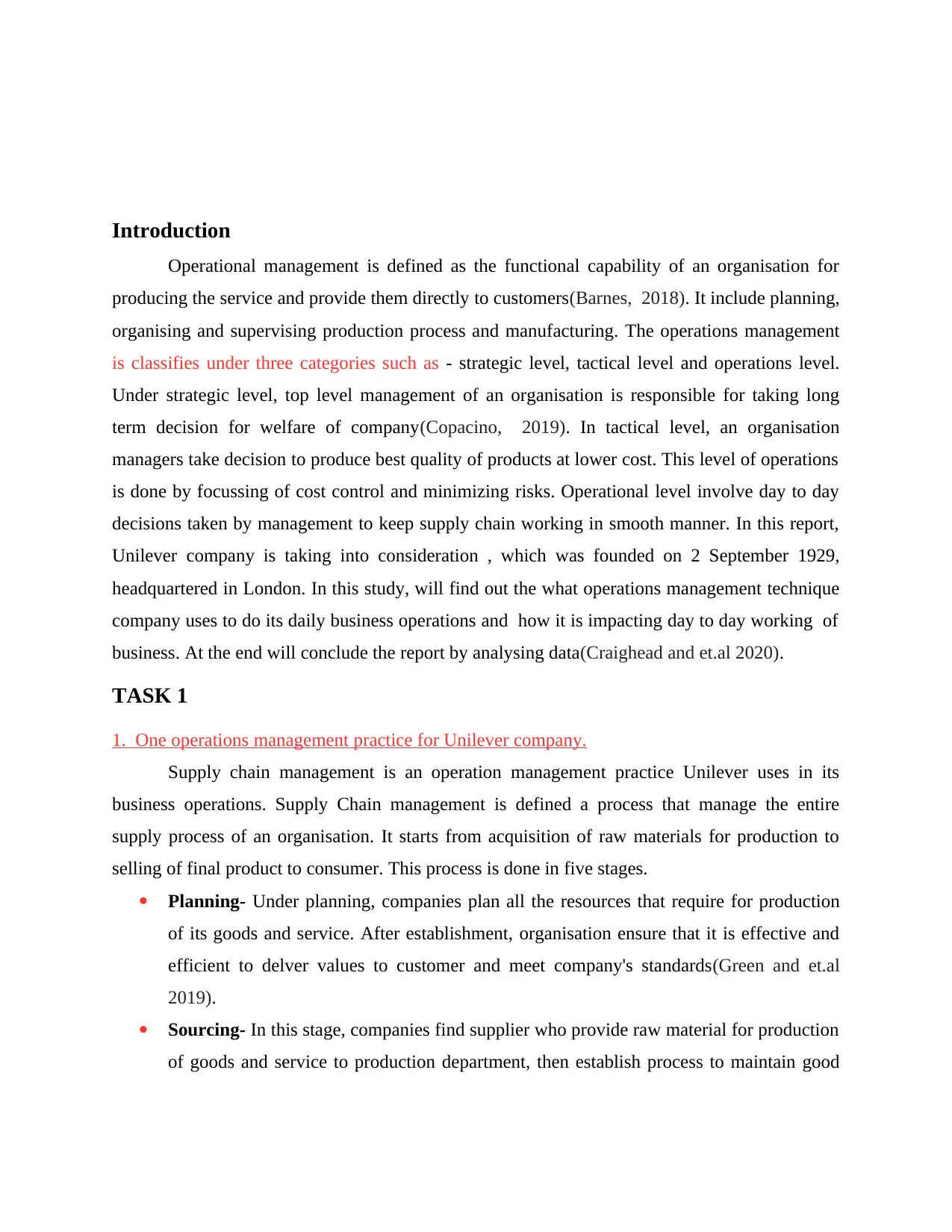
Introduction
Operational management is defined as the functional capability of an organisation for
producing the service and provide them directly to customers(Barnes, 2018). It include planning,
organising and supervising production process and manufacturing. The operations management
is classifies under three categories such as - strategic level, tactical level and operations level.
Under strategic level, top level management of an organisation is responsible for taking long
term decision for welfare of company(Copacino, 2019). In tactical level, an organisation
managers take decision to produce best quality of products at lower cost. This level of operations
is done by focussing of cost control and minimizing risks. Operational level involve day to day
decisions taken by management to keep supply chain working in smooth manner. In this report,
Unilever company is taking into consideration , which was founded on 2 September 1929,
headquartered in London. In this study, will find out the what operations management technique
company uses to do its daily business operations and how it is impacting day to day working of
business. At the end will conclude the report by analysing data(Craighead and et.al 2020).
TASK 1
1. One operations management practice for Unilever company.
Supply chain management is an operation management practice Unilever uses in its
business operations. Supply Chain management is defined a process that manage the entire
supply process of an organisation. It starts from acquisition of raw materials for production to
selling of final product to consumer. This process is done in five stages.
Planning- Under planning, companies plan all the resources that require for production
of its goods and service. After establishment, organisation ensure that it is effective and
efficient to delver values to customer and meet company's standards(Green and et.al
2019).
Sourcing- In this stage, companies find supplier who provide raw material for production
of goods and service to production department, then establish process to maintain good
Operational management is defined as the functional capability of an organisation for
producing the service and provide them directly to customers(Barnes, 2018). It include planning,
organising and supervising production process and manufacturing. The operations management
is classifies under three categories such as - strategic level, tactical level and operations level.
Under strategic level, top level management of an organisation is responsible for taking long
term decision for welfare of company(Copacino, 2019). In tactical level, an organisation
managers take decision to produce best quality of products at lower cost. This level of operations
is done by focussing of cost control and minimizing risks. Operational level involve day to day
decisions taken by management to keep supply chain working in smooth manner. In this report,
Unilever company is taking into consideration , which was founded on 2 September 1929,
headquartered in London. In this study, will find out the what operations management technique
company uses to do its daily business operations and how it is impacting day to day working of
business. At the end will conclude the report by analysing data(Craighead and et.al 2020).
TASK 1
1. One operations management practice for Unilever company.
Supply chain management is an operation management practice Unilever uses in its
business operations. Supply Chain management is defined a process that manage the entire
supply process of an organisation. It starts from acquisition of raw materials for production to
selling of final product to consumer. This process is done in five stages.
Planning- Under planning, companies plan all the resources that require for production
of its goods and service. After establishment, organisation ensure that it is effective and
efficient to delver values to customer and meet company's standards(Green and et.al
2019).
Sourcing- In this stage, companies find supplier who provide raw material for production
of goods and service to production department, then establish process to maintain good
⊘ This is a preview!⊘
Do you want full access?
Subscribe today to unlock all pages.

Trusted by 1+ million students worldwide
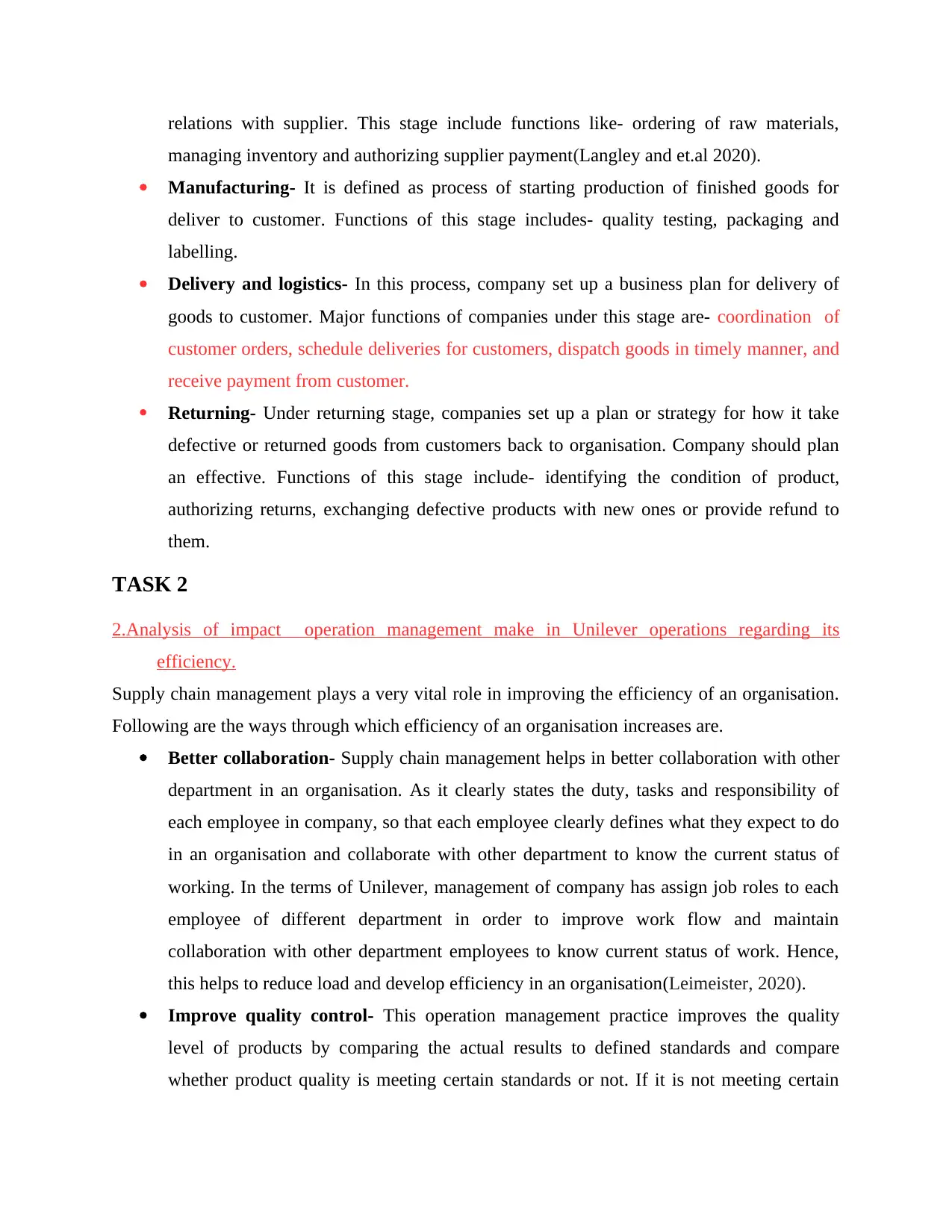
relations with supplier. This stage include functions like- ordering of raw materials,
managing inventory and authorizing supplier payment(Langley and et.al 2020).
Manufacturing- It is defined as process of starting production of finished goods for
deliver to customer. Functions of this stage includes- quality testing, packaging and
labelling.
Delivery and logistics- In this process, company set up a business plan for delivery of
goods to customer. Major functions of companies under this stage are- coordination of
customer orders, schedule deliveries for customers, dispatch goods in timely manner, and
receive payment from customer.
Returning- Under returning stage, companies set up a plan or strategy for how it take
defective or returned goods from customers back to organisation. Company should plan
an effective. Functions of this stage include- identifying the condition of product,
authorizing returns, exchanging defective products with new ones or provide refund to
them.
TASK 2
2.Analysis of impact operation management make in Unilever operations regarding its
efficiency.
Supply chain management plays a very vital role in improving the efficiency of an organisation.
Following are the ways through which efficiency of an organisation increases are.
Better collaboration- Supply chain management helps in better collaboration with other
department in an organisation. As it clearly states the duty, tasks and responsibility of
each employee in company, so that each employee clearly defines what they expect to do
in an organisation and collaborate with other department to know the current status of
working. In the terms of Unilever, management of company has assign job roles to each
employee of different department in order to improve work flow and maintain
collaboration with other department employees to know current status of work. Hence,
this helps to reduce load and develop efficiency in an organisation(Leimeister, 2020).
Improve quality control- This operation management practice improves the quality
level of products by comparing the actual results to defined standards and compare
whether product quality is meeting certain standards or not. If it is not meeting certain
managing inventory and authorizing supplier payment(Langley and et.al 2020).
Manufacturing- It is defined as process of starting production of finished goods for
deliver to customer. Functions of this stage includes- quality testing, packaging and
labelling.
Delivery and logistics- In this process, company set up a business plan for delivery of
goods to customer. Major functions of companies under this stage are- coordination of
customer orders, schedule deliveries for customers, dispatch goods in timely manner, and
receive payment from customer.
Returning- Under returning stage, companies set up a plan or strategy for how it take
defective or returned goods from customers back to organisation. Company should plan
an effective. Functions of this stage include- identifying the condition of product,
authorizing returns, exchanging defective products with new ones or provide refund to
them.
TASK 2
2.Analysis of impact operation management make in Unilever operations regarding its
efficiency.
Supply chain management plays a very vital role in improving the efficiency of an organisation.
Following are the ways through which efficiency of an organisation increases are.
Better collaboration- Supply chain management helps in better collaboration with other
department in an organisation. As it clearly states the duty, tasks and responsibility of
each employee in company, so that each employee clearly defines what they expect to do
in an organisation and collaborate with other department to know the current status of
working. In the terms of Unilever, management of company has assign job roles to each
employee of different department in order to improve work flow and maintain
collaboration with other department employees to know current status of work. Hence,
this helps to reduce load and develop efficiency in an organisation(Leimeister, 2020).
Improve quality control- This operation management practice improves the quality
level of products by comparing the actual results to defined standards and compare
whether product quality is meeting certain standards or not. If it is not meeting certain
Paraphrase This Document
Need a fresh take? Get an instant paraphrase of this document with our AI Paraphraser
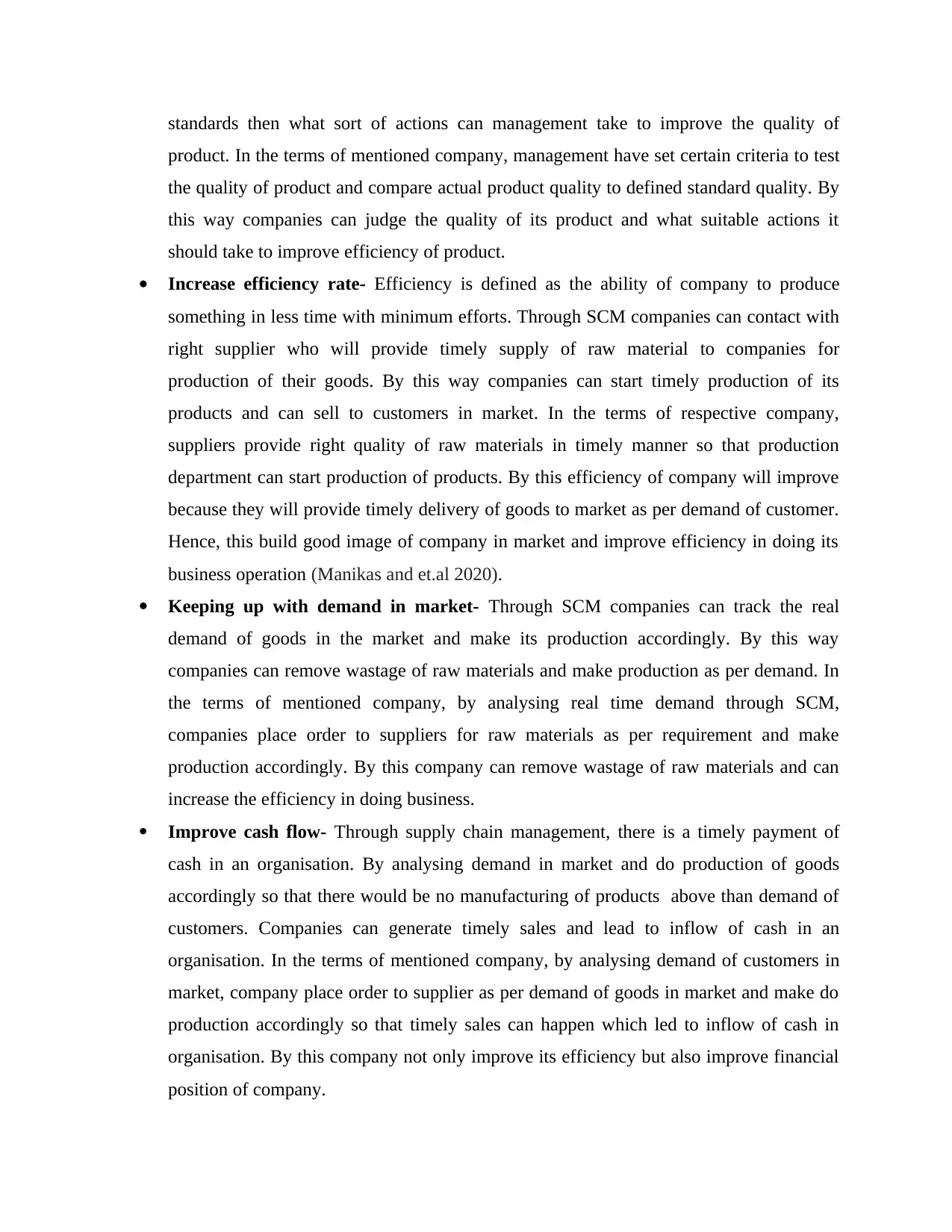
standards then what sort of actions can management take to improve the quality of
product. In the terms of mentioned company, management have set certain criteria to test
the quality of product and compare actual product quality to defined standard quality. By
this way companies can judge the quality of its product and what suitable actions it
should take to improve efficiency of product.
Increase efficiency rate- Efficiency is defined as the ability of company to produce
something in less time with minimum efforts. Through SCM companies can contact with
right supplier who will provide timely supply of raw material to companies for
production of their goods. By this way companies can start timely production of its
products and can sell to customers in market. In the terms of respective company,
suppliers provide right quality of raw materials in timely manner so that production
department can start production of products. By this efficiency of company will improve
because they will provide timely delivery of goods to market as per demand of customer.
Hence, this build good image of company in market and improve efficiency in doing its
business operation (Manikas and et.al 2020).
Keeping up with demand in market- Through SCM companies can track the real
demand of goods in the market and make its production accordingly. By this way
companies can remove wastage of raw materials and make production as per demand. In
the terms of mentioned company, by analysing real time demand through SCM,
companies place order to suppliers for raw materials as per requirement and make
production accordingly. By this company can remove wastage of raw materials and can
increase the efficiency in doing business.
Improve cash flow- Through supply chain management, there is a timely payment of
cash in an organisation. By analysing demand in market and do production of goods
accordingly so that there would be no manufacturing of products above than demand of
customers. Companies can generate timely sales and lead to inflow of cash in an
organisation. In the terms of mentioned company, by analysing demand of customers in
market, company place order to supplier as per demand of goods in market and make do
production accordingly so that timely sales can happen which led to inflow of cash in
organisation. By this company not only improve its efficiency but also improve financial
position of company.
product. In the terms of mentioned company, management have set certain criteria to test
the quality of product and compare actual product quality to defined standard quality. By
this way companies can judge the quality of its product and what suitable actions it
should take to improve efficiency of product.
Increase efficiency rate- Efficiency is defined as the ability of company to produce
something in less time with minimum efforts. Through SCM companies can contact with
right supplier who will provide timely supply of raw material to companies for
production of their goods. By this way companies can start timely production of its
products and can sell to customers in market. In the terms of respective company,
suppliers provide right quality of raw materials in timely manner so that production
department can start production of products. By this efficiency of company will improve
because they will provide timely delivery of goods to market as per demand of customer.
Hence, this build good image of company in market and improve efficiency in doing its
business operation (Manikas and et.al 2020).
Keeping up with demand in market- Through SCM companies can track the real
demand of goods in the market and make its production accordingly. By this way
companies can remove wastage of raw materials and make production as per demand. In
the terms of mentioned company, by analysing real time demand through SCM,
companies place order to suppliers for raw materials as per requirement and make
production accordingly. By this company can remove wastage of raw materials and can
increase the efficiency in doing business.
Improve cash flow- Through supply chain management, there is a timely payment of
cash in an organisation. By analysing demand in market and do production of goods
accordingly so that there would be no manufacturing of products above than demand of
customers. Companies can generate timely sales and lead to inflow of cash in an
organisation. In the terms of mentioned company, by analysing demand of customers in
market, company place order to supplier as per demand of goods in market and make do
production accordingly so that timely sales can happen which led to inflow of cash in
organisation. By this company not only improve its efficiency but also improve financial
position of company.
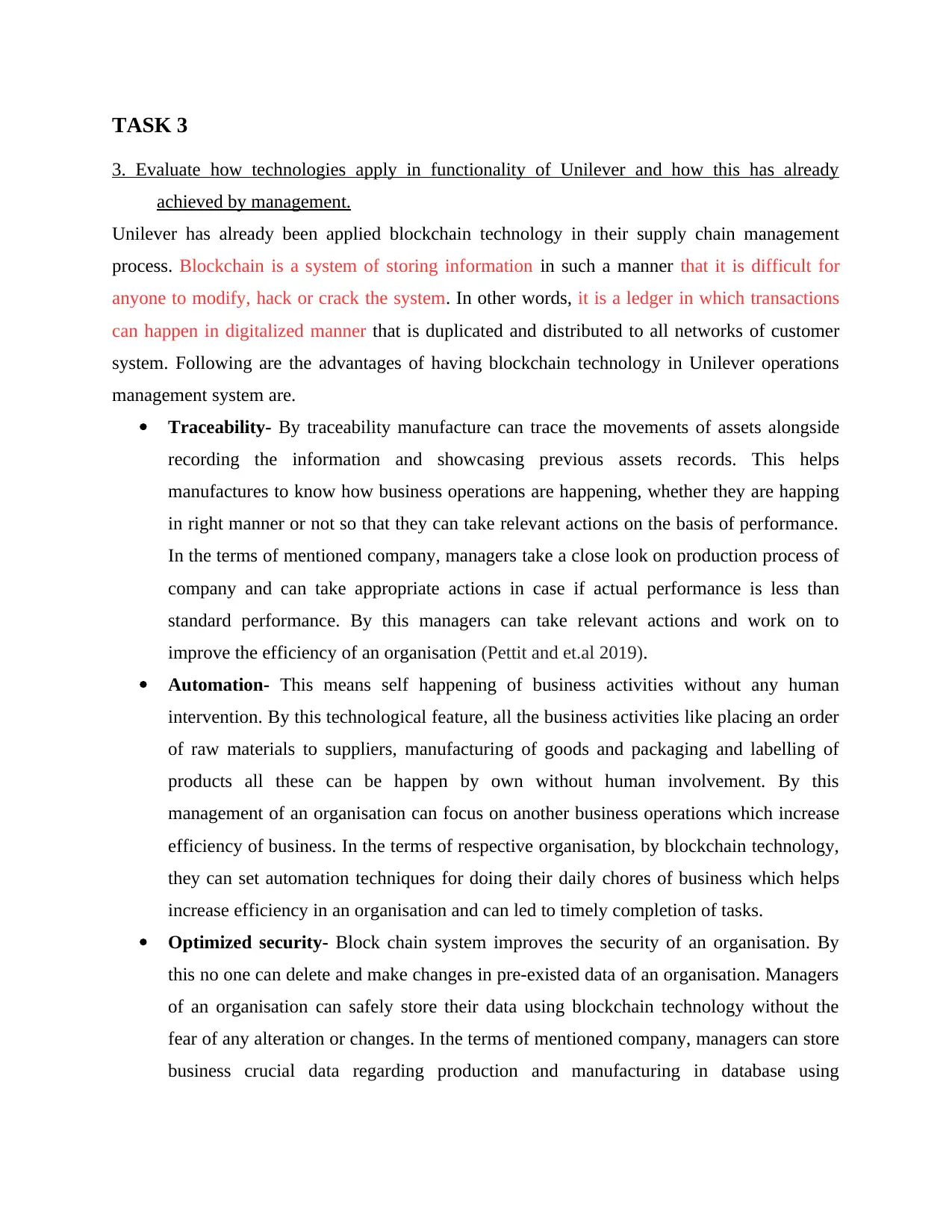
TASK 3
3. Evaluate how technologies apply in functionality of Unilever and how this has already
achieved by management.
Unilever has already been applied blockchain technology in their supply chain management
process. Blockchain is a system of storing information in such a manner that it is difficult for
anyone to modify, hack or crack the system. In other words, it is a ledger in which transactions
can happen in digitalized manner that is duplicated and distributed to all networks of customer
system. Following are the advantages of having blockchain technology in Unilever operations
management system are.
Traceability- By traceability manufacture can trace the movements of assets alongside
recording the information and showcasing previous assets records. This helps
manufactures to know how business operations are happening, whether they are happing
in right manner or not so that they can take relevant actions on the basis of performance.
In the terms of mentioned company, managers take a close look on production process of
company and can take appropriate actions in case if actual performance is less than
standard performance. By this managers can take relevant actions and work on to
improve the efficiency of an organisation (Pettit and et.al 2019).
Automation- This means self happening of business activities without any human
intervention. By this technological feature, all the business activities like placing an order
of raw materials to suppliers, manufacturing of goods and packaging and labelling of
products all these can be happen by own without human involvement. By this
management of an organisation can focus on another business operations which increase
efficiency of business. In the terms of respective organisation, by blockchain technology,
they can set automation techniques for doing their daily chores of business which helps
increase efficiency in an organisation and can led to timely completion of tasks.
Optimized security- Block chain system improves the security of an organisation. By
this no one can delete and make changes in pre-existed data of an organisation. Managers
of an organisation can safely store their data using blockchain technology without the
fear of any alteration or changes. In the terms of mentioned company, managers can store
business crucial data regarding production and manufacturing in database using
3. Evaluate how technologies apply in functionality of Unilever and how this has already
achieved by management.
Unilever has already been applied blockchain technology in their supply chain management
process. Blockchain is a system of storing information in such a manner that it is difficult for
anyone to modify, hack or crack the system. In other words, it is a ledger in which transactions
can happen in digitalized manner that is duplicated and distributed to all networks of customer
system. Following are the advantages of having blockchain technology in Unilever operations
management system are.
Traceability- By traceability manufacture can trace the movements of assets alongside
recording the information and showcasing previous assets records. This helps
manufactures to know how business operations are happening, whether they are happing
in right manner or not so that they can take relevant actions on the basis of performance.
In the terms of mentioned company, managers take a close look on production process of
company and can take appropriate actions in case if actual performance is less than
standard performance. By this managers can take relevant actions and work on to
improve the efficiency of an organisation (Pettit and et.al 2019).
Automation- This means self happening of business activities without any human
intervention. By this technological feature, all the business activities like placing an order
of raw materials to suppliers, manufacturing of goods and packaging and labelling of
products all these can be happen by own without human involvement. By this
management of an organisation can focus on another business operations which increase
efficiency of business. In the terms of respective organisation, by blockchain technology,
they can set automation techniques for doing their daily chores of business which helps
increase efficiency in an organisation and can led to timely completion of tasks.
Optimized security- Block chain system improves the security of an organisation. By
this no one can delete and make changes in pre-existed data of an organisation. Managers
of an organisation can safely store their data using blockchain technology without the
fear of any alteration or changes. In the terms of mentioned company, managers can store
business crucial data regarding production and manufacturing in database using
⊘ This is a preview!⊘
Do you want full access?
Subscribe today to unlock all pages.

Trusted by 1+ million students worldwide
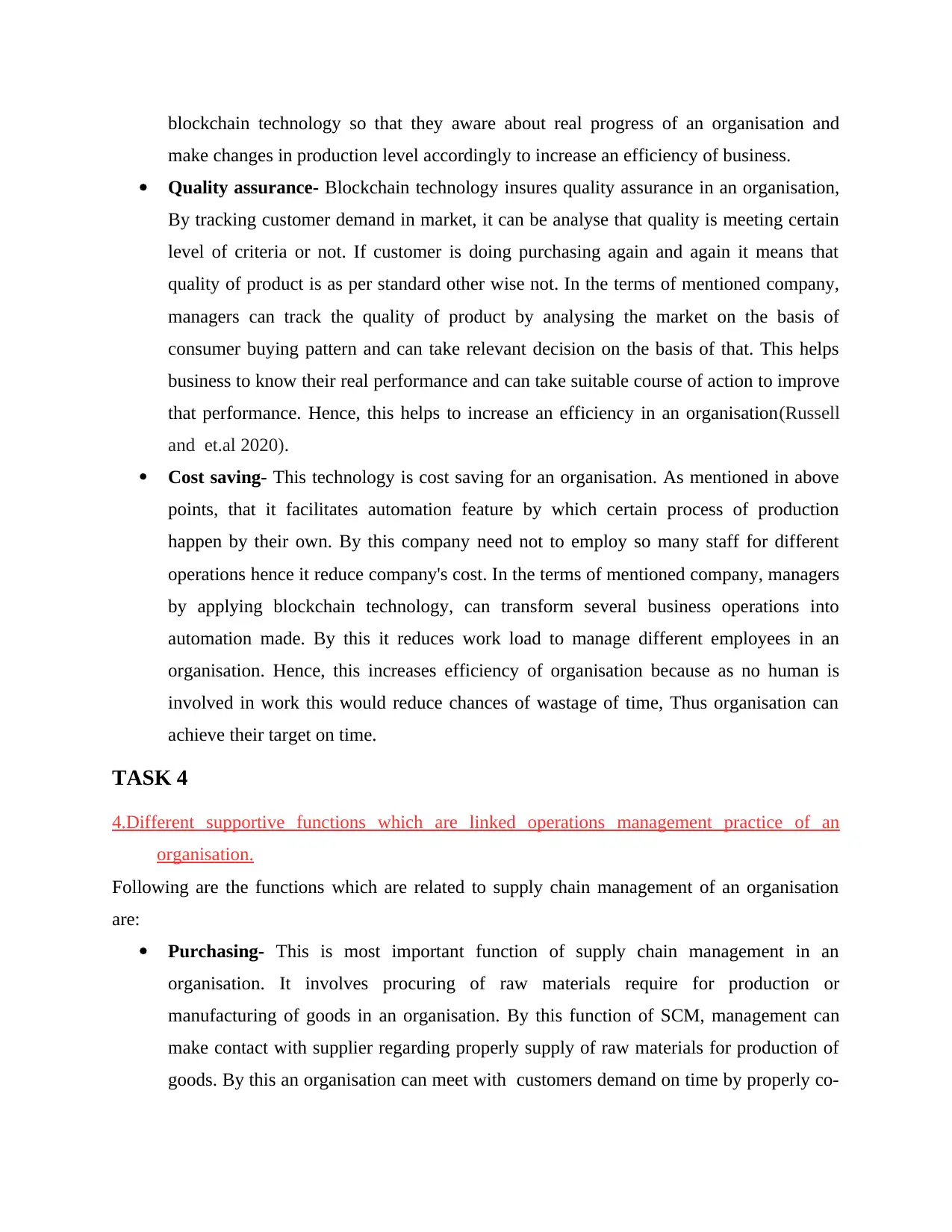
blockchain technology so that they aware about real progress of an organisation and
make changes in production level accordingly to increase an efficiency of business.
Quality assurance- Blockchain technology insures quality assurance in an organisation,
By tracking customer demand in market, it can be analyse that quality is meeting certain
level of criteria or not. If customer is doing purchasing again and again it means that
quality of product is as per standard other wise not. In the terms of mentioned company,
managers can track the quality of product by analysing the market on the basis of
consumer buying pattern and can take relevant decision on the basis of that. This helps
business to know their real performance and can take suitable course of action to improve
that performance. Hence, this helps to increase an efficiency in an organisation(Russell
and et.al 2020).
Cost saving- This technology is cost saving for an organisation. As mentioned in above
points, that it facilitates automation feature by which certain process of production
happen by their own. By this company need not to employ so many staff for different
operations hence it reduce company's cost. In the terms of mentioned company, managers
by applying blockchain technology, can transform several business operations into
automation made. By this it reduces work load to manage different employees in an
organisation. Hence, this increases efficiency of organisation because as no human is
involved in work this would reduce chances of wastage of time, Thus organisation can
achieve their target on time.
TASK 4
4.Different supportive functions which are linked operations management practice of an
organisation.
Following are the functions which are related to supply chain management of an organisation
are:
Purchasing- This is most important function of supply chain management in an
organisation. It involves procuring of raw materials require for production or
manufacturing of goods in an organisation. By this function of SCM, management can
make contact with supplier regarding properly supply of raw materials for production of
goods. By this an organisation can meet with customers demand on time by properly co-
make changes in production level accordingly to increase an efficiency of business.
Quality assurance- Blockchain technology insures quality assurance in an organisation,
By tracking customer demand in market, it can be analyse that quality is meeting certain
level of criteria or not. If customer is doing purchasing again and again it means that
quality of product is as per standard other wise not. In the terms of mentioned company,
managers can track the quality of product by analysing the market on the basis of
consumer buying pattern and can take relevant decision on the basis of that. This helps
business to know their real performance and can take suitable course of action to improve
that performance. Hence, this helps to increase an efficiency in an organisation(Russell
and et.al 2020).
Cost saving- This technology is cost saving for an organisation. As mentioned in above
points, that it facilitates automation feature by which certain process of production
happen by their own. By this company need not to employ so many staff for different
operations hence it reduce company's cost. In the terms of mentioned company, managers
by applying blockchain technology, can transform several business operations into
automation made. By this it reduces work load to manage different employees in an
organisation. Hence, this increases efficiency of organisation because as no human is
involved in work this would reduce chances of wastage of time, Thus organisation can
achieve their target on time.
TASK 4
4.Different supportive functions which are linked operations management practice of an
organisation.
Following are the functions which are related to supply chain management of an organisation
are:
Purchasing- This is most important function of supply chain management in an
organisation. It involves procuring of raw materials require for production or
manufacturing of goods in an organisation. By this function of SCM, management can
make contact with supplier regarding properly supply of raw materials for production of
goods. By this an organisation can meet with customers demand on time by properly co-
Paraphrase This Document
Need a fresh take? Get an instant paraphrase of this document with our AI Paraphraser
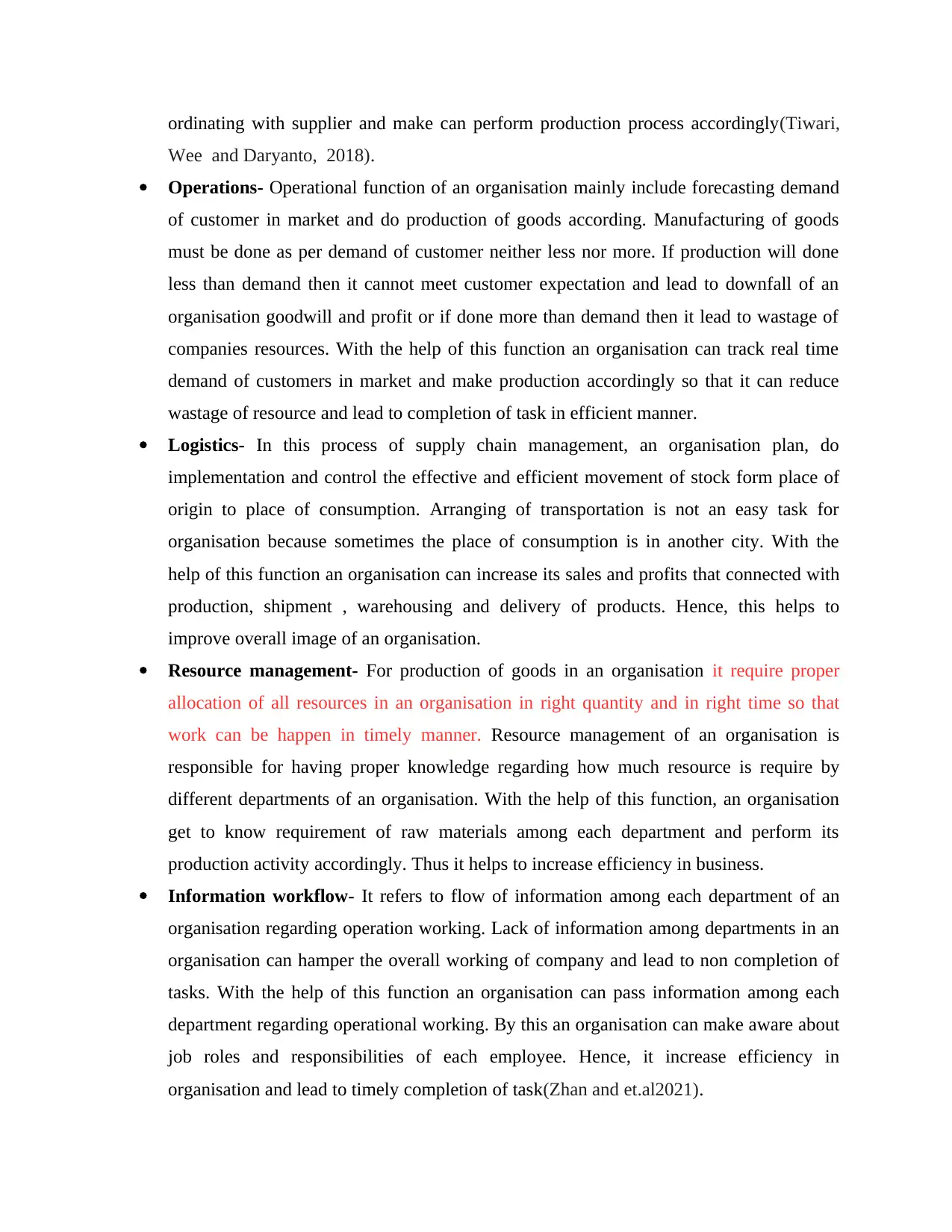
ordinating with supplier and make can perform production process accordingly(Tiwari,
Wee and Daryanto, 2018).
Operations- Operational function of an organisation mainly include forecasting demand
of customer in market and do production of goods according. Manufacturing of goods
must be done as per demand of customer neither less nor more. If production will done
less than demand then it cannot meet customer expectation and lead to downfall of an
organisation goodwill and profit or if done more than demand then it lead to wastage of
companies resources. With the help of this function an organisation can track real time
demand of customers in market and make production accordingly so that it can reduce
wastage of resource and lead to completion of task in efficient manner.
Logistics- In this process of supply chain management, an organisation plan, do
implementation and control the effective and efficient movement of stock form place of
origin to place of consumption. Arranging of transportation is not an easy task for
organisation because sometimes the place of consumption is in another city. With the
help of this function an organisation can increase its sales and profits that connected with
production, shipment , warehousing and delivery of products. Hence, this helps to
improve overall image of an organisation.
Resource management- For production of goods in an organisation it require proper
allocation of all resources in an organisation in right quantity and in right time so that
work can be happen in timely manner. Resource management of an organisation is
responsible for having proper knowledge regarding how much resource is require by
different departments of an organisation. With the help of this function, an organisation
get to know requirement of raw materials among each department and perform its
production activity accordingly. Thus it helps to increase efficiency in business.
Information workflow- It refers to flow of information among each department of an
organisation regarding operation working. Lack of information among departments in an
organisation can hamper the overall working of company and lead to non completion of
tasks. With the help of this function an organisation can pass information among each
department regarding operational working. By this an organisation can make aware about
job roles and responsibilities of each employee. Hence, it increase efficiency in
organisation and lead to timely completion of task(Zhan and et.al2021).
Wee and Daryanto, 2018).
Operations- Operational function of an organisation mainly include forecasting demand
of customer in market and do production of goods according. Manufacturing of goods
must be done as per demand of customer neither less nor more. If production will done
less than demand then it cannot meet customer expectation and lead to downfall of an
organisation goodwill and profit or if done more than demand then it lead to wastage of
companies resources. With the help of this function an organisation can track real time
demand of customers in market and make production accordingly so that it can reduce
wastage of resource and lead to completion of task in efficient manner.
Logistics- In this process of supply chain management, an organisation plan, do
implementation and control the effective and efficient movement of stock form place of
origin to place of consumption. Arranging of transportation is not an easy task for
organisation because sometimes the place of consumption is in another city. With the
help of this function an organisation can increase its sales and profits that connected with
production, shipment , warehousing and delivery of products. Hence, this helps to
improve overall image of an organisation.
Resource management- For production of goods in an organisation it require proper
allocation of all resources in an organisation in right quantity and in right time so that
work can be happen in timely manner. Resource management of an organisation is
responsible for having proper knowledge regarding how much resource is require by
different departments of an organisation. With the help of this function, an organisation
get to know requirement of raw materials among each department and perform its
production activity accordingly. Thus it helps to increase efficiency in business.
Information workflow- It refers to flow of information among each department of an
organisation regarding operation working. Lack of information among departments in an
organisation can hamper the overall working of company and lead to non completion of
tasks. With the help of this function an organisation can pass information among each
department regarding operational working. By this an organisation can make aware about
job roles and responsibilities of each employee. Hence, it increase efficiency in
organisation and lead to timely completion of task(Zhan and et.al2021).
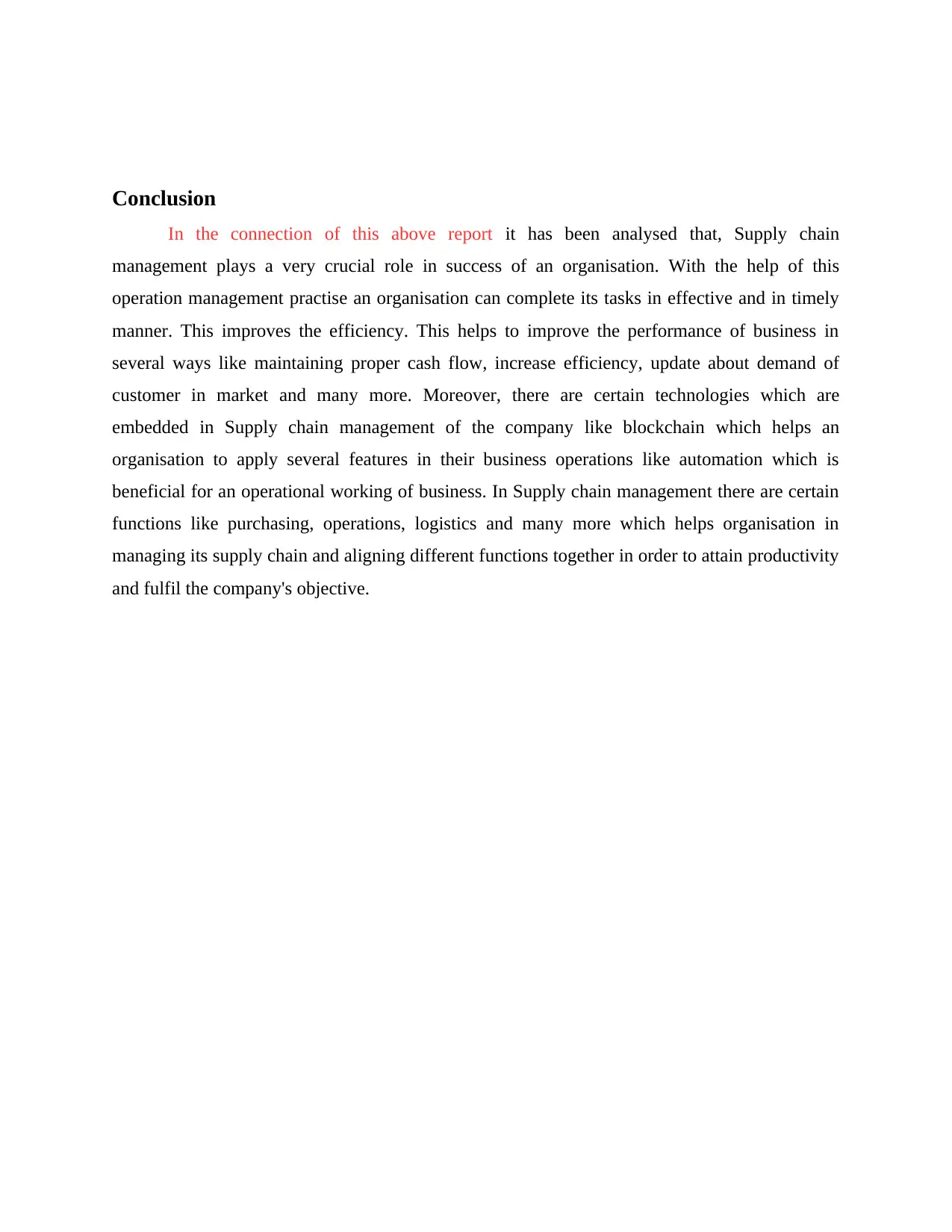
Conclusion
In the connection of this above report it has been analysed that, Supply chain
management plays a very crucial role in success of an organisation. With the help of this
operation management practise an organisation can complete its tasks in effective and in timely
manner. This improves the efficiency. This helps to improve the performance of business in
several ways like maintaining proper cash flow, increase efficiency, update about demand of
customer in market and many more. Moreover, there are certain technologies which are
embedded in Supply chain management of the company like blockchain which helps an
organisation to apply several features in their business operations like automation which is
beneficial for an operational working of business. In Supply chain management there are certain
functions like purchasing, operations, logistics and many more which helps organisation in
managing its supply chain and aligning different functions together in order to attain productivity
and fulfil the company's objective.
In the connection of this above report it has been analysed that, Supply chain
management plays a very crucial role in success of an organisation. With the help of this
operation management practise an organisation can complete its tasks in effective and in timely
manner. This improves the efficiency. This helps to improve the performance of business in
several ways like maintaining proper cash flow, increase efficiency, update about demand of
customer in market and many more. Moreover, there are certain technologies which are
embedded in Supply chain management of the company like blockchain which helps an
organisation to apply several features in their business operations like automation which is
beneficial for an operational working of business. In Supply chain management there are certain
functions like purchasing, operations, logistics and many more which helps organisation in
managing its supply chain and aligning different functions together in order to attain productivity
and fulfil the company's objective.
⊘ This is a preview!⊘
Do you want full access?
Subscribe today to unlock all pages.

Trusted by 1+ million students worldwide
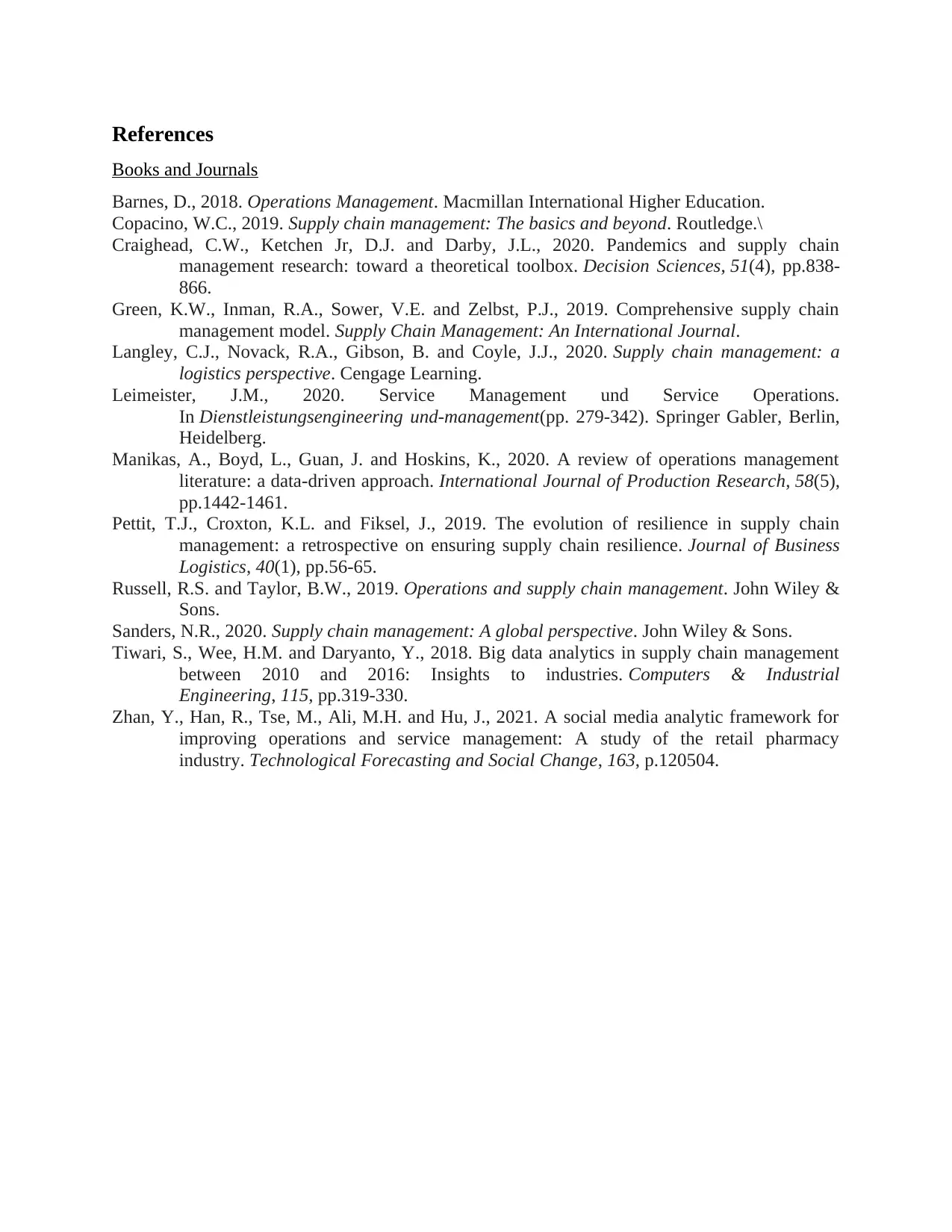
References
Books and Journals
Barnes, D., 2018. Operations Management. Macmillan International Higher Education.
Copacino, W.C., 2019. Supply chain management: The basics and beyond. Routledge.\
Craighead, C.W., Ketchen Jr, D.J. and Darby, J.L., 2020. Pandemics and supply chain
management research: toward a theoretical toolbox. Decision Sciences, 51(4), pp.838-
866.
Green, K.W., Inman, R.A., Sower, V.E. and Zelbst, P.J., 2019. Comprehensive supply chain
management model. Supply Chain Management: An International Journal.
Langley, C.J., Novack, R.A., Gibson, B. and Coyle, J.J., 2020. Supply chain management: a
logistics perspective. Cengage Learning.
Leimeister, J.M., 2020. Service Management und Service Operations.
In Dienstleistungsengineering und-management(pp. 279-342). Springer Gabler, Berlin,
Heidelberg.
Manikas, A., Boyd, L., Guan, J. and Hoskins, K., 2020. A review of operations management
literature: a data-driven approach. International Journal of Production Research, 58(5),
pp.1442-1461.
Pettit, T.J., Croxton, K.L. and Fiksel, J., 2019. The evolution of resilience in supply chain
management: a retrospective on ensuring supply chain resilience. Journal of Business
Logistics, 40(1), pp.56-65.
Russell, R.S. and Taylor, B.W., 2019. Operations and supply chain management. John Wiley &
Sons.
Sanders, N.R., 2020. Supply chain management: A global perspective. John Wiley & Sons.
Tiwari, S., Wee, H.M. and Daryanto, Y., 2018. Big data analytics in supply chain management
between 2010 and 2016: Insights to industries. Computers & Industrial
Engineering, 115, pp.319-330.
Zhan, Y., Han, R., Tse, M., Ali, M.H. and Hu, J., 2021. A social media analytic framework for
improving operations and service management: A study of the retail pharmacy
industry. Technological Forecasting and Social Change, 163, p.120504.
Books and Journals
Barnes, D., 2018. Operations Management. Macmillan International Higher Education.
Copacino, W.C., 2019. Supply chain management: The basics and beyond. Routledge.\
Craighead, C.W., Ketchen Jr, D.J. and Darby, J.L., 2020. Pandemics and supply chain
management research: toward a theoretical toolbox. Decision Sciences, 51(4), pp.838-
866.
Green, K.W., Inman, R.A., Sower, V.E. and Zelbst, P.J., 2019. Comprehensive supply chain
management model. Supply Chain Management: An International Journal.
Langley, C.J., Novack, R.A., Gibson, B. and Coyle, J.J., 2020. Supply chain management: a
logistics perspective. Cengage Learning.
Leimeister, J.M., 2020. Service Management und Service Operations.
In Dienstleistungsengineering und-management(pp. 279-342). Springer Gabler, Berlin,
Heidelberg.
Manikas, A., Boyd, L., Guan, J. and Hoskins, K., 2020. A review of operations management
literature: a data-driven approach. International Journal of Production Research, 58(5),
pp.1442-1461.
Pettit, T.J., Croxton, K.L. and Fiksel, J., 2019. The evolution of resilience in supply chain
management: a retrospective on ensuring supply chain resilience. Journal of Business
Logistics, 40(1), pp.56-65.
Russell, R.S. and Taylor, B.W., 2019. Operations and supply chain management. John Wiley &
Sons.
Sanders, N.R., 2020. Supply chain management: A global perspective. John Wiley & Sons.
Tiwari, S., Wee, H.M. and Daryanto, Y., 2018. Big data analytics in supply chain management
between 2010 and 2016: Insights to industries. Computers & Industrial
Engineering, 115, pp.319-330.
Zhan, Y., Han, R., Tse, M., Ali, M.H. and Hu, J., 2021. A social media analytic framework for
improving operations and service management: A study of the retail pharmacy
industry. Technological Forecasting and Social Change, 163, p.120504.
1 out of 10
Related Documents
Your All-in-One AI-Powered Toolkit for Academic Success.
+13062052269
info@desklib.com
Available 24*7 on WhatsApp / Email
![[object Object]](/_next/static/media/star-bottom.7253800d.svg)
Unlock your academic potential
Copyright © 2020–2026 A2Z Services. All Rights Reserved. Developed and managed by ZUCOL.



